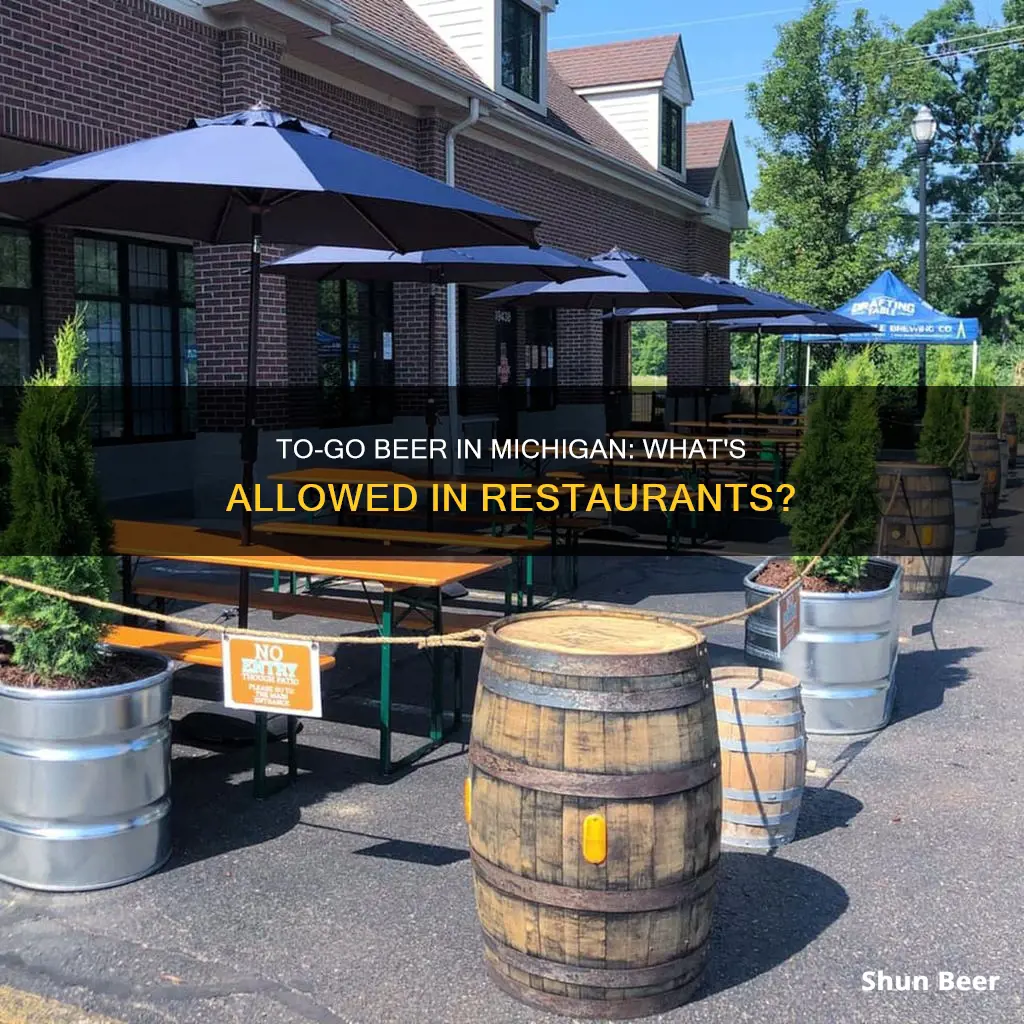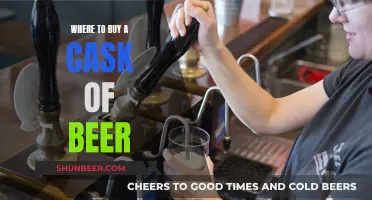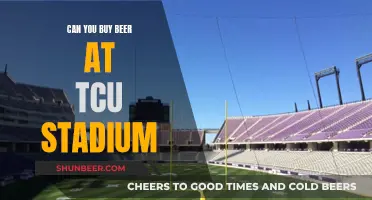
Michigan's laws on buying beer to go from restaurants have changed in recent years, with the state relaxing some of its liquor laws during the pandemic to help restaurants stay profitable. A law passed in 2020 allows restaurants and bars with a Class C liquor license to sell cocktails, beer, and wine for off-site consumption, with third-party services permitted to deliver those drinks to customers. This law is currently in effect until the end of 2025.
Michigan has also set rules for both on- and off-site locations regarding alcohol sales times. Beer can be bought from 7 am to 2 am, Monday to Saturday, at any licensed location. Counties and smaller localities are allowed to vote for stricter sales times. Sunday sales are allowed with a permit, and beer cannot be sold at any location between 11:59 pm on December 24 and noon on December 25.
What You'll Learn

Michigan's liquor laws
Hours of Sale
In Michigan, alcohol can be purchased on-premise and off-premise from 7 am to 2 am, Monday to Saturday, and from noon to 2 am on Sundays. Retailers can obtain a special license extension to sell alcohol from 7 am on Sundays as well.
Age Restrictions
Michigan state law prohibits the sale of alcohol to anyone under the age of 21 and forbids the sale of alcohol to intoxicated individuals. The state has set a fine of $1,000 for the first offense of selling alcohol to minors, with steeper fines for subsequent offenses.
Retailer Restrictions
Retailers are not allowed to sponsor contests that require alcohol or use it as a prize. The state also has a monopoly on the wholesale sales of distilled spirits, which means they dictate the market price, and a minimum price is mandated for all alcohol sales.
Grocery and convenience stores, as well as gas stations (except in Wayne County), can sell beer and wine. These retailers must have an alcohol sales permit to sell liquor.
Excise Tax
Michigan enforces a strict excise tax on alcohol:
- Beer Tax: $0.20/gallon
- Wine Tax: $0.51/gallon
- Federal Alcohol Excise Tax: included in the price of the beverage sold
Temporary Licenses
Temporary licenses are available for bona fide nonprofit organizations, and an organization can obtain up to 12 special licenses per year.
Open Container Law
Michigan law prohibits the transport and possession of open containers in public places, with an exception for social districts approved by local governments. An open container is defined as a container with a broken or removed seal, even if it is full.
Zero Tolerance Law
Michigan has a "zero tolerance" law that prohibits anyone under 21 from operating a motor vehicle with any bodily alcohol content.
Three-Tier Distribution System
Michigan's unique three-tier distribution system mandates strict legal separation between alcohol producers, retailers, and wholesale distributors. This system limits craft breweries' freedom to choose their distributors and restricts their ability to sell directly to large discount stores or small grocery stores.
Alcohol Energy Drinks
The state has banned alcohol energy drinks from the Michigan market due to health and safety concerns, particularly among youth.
Cocktails-to-Go
During the COVID-19 pandemic, there was a push to allow restaurants and bars to sell cocktails for takeout or delivery, but this idea did not receive much support from state officials due to public health and safety concerns.
Dram Shop Law
Michigan's dram shop law allows victims of drunk driving accidents to sue businesses that serve alcohol to intoxicated individuals or minors before the crash.
Buying Beers for the Band: Is It Acceptable?
You may want to see also

Beer sales times
However, it is important to note that retailers can obtain a special license extension to sell alcohol from 7:00 a.m. on Sundays, enabling them to commence sales earlier than the usual noon start time. Additionally, Michigan law prohibits the sale of alcohol after 9:00 p.m. on December 24 and throughout December 25, with the exception of on-premise sales on January 1, which are permitted until 4:00 a.m.
The state also enforces specific days and times when alcohol sales are prohibited. For instance, alcohol cannot be sold from 2:30 a.m. to 12:00 noon on Sundays, or from 2:30 a.m. to 7:00 a.m. on any other day. Furthermore, local governments have the authority to prohibit alcohol sales on certain days, such as legal holidays, primary and general election days, and between 7:00 a.m. and 12:00 noon on Sundays.
Michigan's alcohol sales regulations also vary depending on the type of establishment. Grocery and convenience stores are permitted to sell beer, wine, and liquor. Gas stations can also sell these alcoholic beverages, provided they possess an alcohol sales permit, except in Wayne County, where alcohol sales at gas stations are prohibited.
During the COVID-19 pandemic, there was a push for restaurants and bars to be allowed to sell cocktails for takeout or delivery, as they were already permitted to sell beer and wine for delivery and takeout. However, this proposal did not receive much support from state officials, and the Michigan Liquor Control Commission chose not to consider it at the time.
The sale of alcohol in Michigan is closely monitored and regulated by the Michigan Liquor Control Commission, which aims to protect public health and safety while also supporting the state's alcohol industry.
Beer Buying in Murfreesboro, TN: Sunday Blues?
You may want to see also

Sunday sales laws
Michigan's Sunday sales laws allow for the sale of beer, wine, and spirits from 7 a.m. to 2 a.m. on Sundays, provided that the retailer has obtained the necessary licenses and permits.
On-premise and off-premise retailers in Michigan can sell alcohol from 7 a.m. to 2 a.m., Monday to Saturday, and from noon to 2 a.m. on Sundays. However, retailers can obtain a special license extension to sell alcohol from 7 a.m. on Sundays. This extension is particularly relevant for restaurants and bars that wish to serve alcohol with breakfast or brunch.
To obtain a Sunday sales license, retailers must apply to the Michigan Liquor Control Commission (MLCC). The MLCC is responsible for regulating the distribution and sale of alcohol in the state and has strict guidelines that businesses must follow.
In addition to the state regulations, individual counties in Michigan can impose additional restrictions on alcohol sales. For example, a county may prohibit the sale of alcohol for on-premise consumption between 7 a.m. and 12 noon on Sundays. This means that even with a state-issued Sunday sales license, businesses must also comply with local laws and regulations.
It is worth noting that Michigan has only one partially dry county: Oak Park. The county allows only 20 restaurants to obtain a tavern license, which permits the sale of alcohol for on-premise consumption. The rest of the state has no restrictions on the sale of alcohol, as long as the retailers have the appropriate licenses and comply with the sales hours.
During certain holidays, there are also restrictions on alcohol sales. For example, the sale of alcohol is prohibited from 11:59 p.m. on December 24 to 12 noon on December 25. On New Year's Eve, however, on-premise licensees are allowed to sell alcohol until 4 a.m. on January 1.
Buying Beer in Connecticut on Sundays: Is it Legal?
You may want to see also

Alcohol delivery laws
- Prior to the pandemic, Michigan law prohibited bars and restaurants from selling cocktails off-premises. However, during the pandemic, temporary measures were implemented to allow for cocktail sales via takeout or delivery, provided they were in sealed containers. This measure was intended to support the hospitality industry during the challenging period.
- The state's Liquor Control Commission (MLCC) plays a crucial role in regulating alcohol sales and distribution. They hold a monopoly over spirits distribution and set a 65% markup on hard liquor, which includes a 17% discount for retailers such as restaurants and liquor stores.
- In July 2020, a package of 16 bills was approved, making significant changes to the state's liquor laws. One of the most notable changes was the legalization of to-go cocktail sales and delivery until 2025. This has provided a boost to bars and restaurants, allowing them to reach customers who prefer to consume at home.
- Under the new laws, third-party delivery services can now transport and deliver alcoholic beverages, including cocktails, beer, and wine. Customers are required to show valid identification upon delivery.
- The legislation also introduced the concept of "social districts," where customers can purchase to-go drinks from adjacent bars and consume them within a designated area. This has provided additional flexibility for businesses and consumers.
- Michigan has strict laws regarding the sale of alcohol to minors, with a minimum drinking age of 21. It is illegal to sell or provide alcohol to anyone under this age, and servers must be at least 18 years old.
- The state also has specific laws regarding the transportation and possession of open containers. While generally prohibited, there are now exceptions for social districts approved by local governments.
- Michigan has a three-tier system for alcohol distribution, where producers can only sell their products to wholesale distributors, who then sell to retailers, who ultimately sell to consumers. This system can impact small breweries and their ability to self-distribute.
- The MLCC sets the hours during which alcohol can be sold in Michigan. On Mondays through Saturdays, alcohol sales are permitted from 7 a.m. to 2 a.m., while on Sundays, sales are allowed from noon to 2 a.m. There are also restrictions on certain holidays, such as Christmas Eve and Christmas Day.
Beer Availability at ASU Football Games
You may want to see also

Drinking laws
Michigan's drinking laws are extensive and strict. The legal drinking age in Michigan is 21, and it is illegal for minors under this age to possess or consume alcohol. The state also has a zero-tolerance policy for driving under the influence, with a blood alcohol content limit of 0.02% for minors and 0.08% for adults. Michigan's drinking laws also include an open container law, which prohibits open containers of alcohol in vehicles, and a ban on alcohol energy drinks.
In terms of purchasing alcohol, Michigan is an alcohol monopoly state for packaged distilled spirits, and the state sets the minimum prices. Alcohol can be purchased from 7 am to 2 am, Monday to Saturday, and from noon to 2 am on Sundays. However, alcohol sales are prohibited after 9 pm on December 24 and all day on December 25. Grocery and convenience stores may sell beer and wine, but gas stations in Wayne County may not. Restaurants and bars are not usually allowed to sell cocktails for takeout or delivery, but this rule was temporarily lifted during the COVID-19 pandemic.
Michigan's three-tier distribution system is another unique aspect of its drinking laws. This system strictly separates the producers, wholesalers, and retailers of beer and wine, making it difficult for small craft brewers to distribute their products directly to consumers. The state's Liquor Control Commission enforces these laws and has the power to revoke licenses for violations.
Buying Beer: Hannaford's Alcohol Policy Explained
You may want to see also
Frequently asked questions
Yes, restaurants and bars with a Class C liquor license can sell beer for off-premises consumption.
Beer can be bought from 7 a.m. to 2 a.m. Monday to Saturday and from 7 a.m. to 11:59 p.m. on Sundays, as long as the restaurant has the proper permits.
To sell beer for off-premises consumption, restaurants and bars must have a Class C liquor license.







